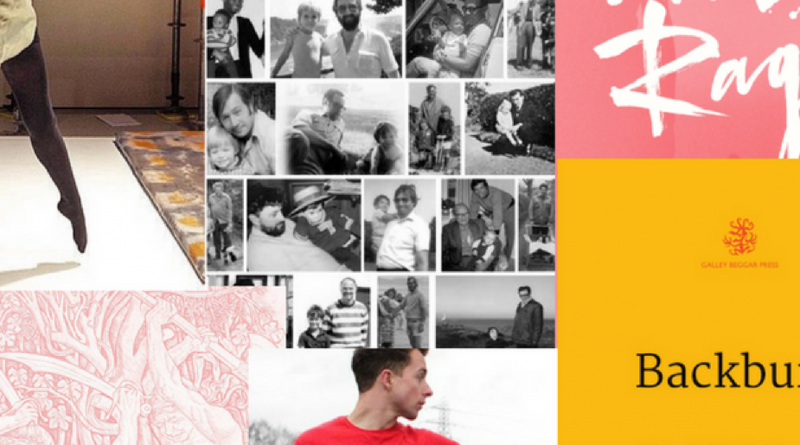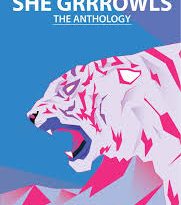Sabotage Reviews’ End of Year Critic’s Choice 2016
It’s that time of year again when reviewers and editors look back on this year’s publications and performances and share their favourites:
Becky Varley-Winter, Poetry Reviews Editor, shares her favourites:
Among pamphlets, I’ve been impressed by Richard Scott‘s Wound (Rialto), pamphlets by Clinic (Edwina Attlee‘s The Cream and Chloe Stopa-Hunt‘s White Hills), and Primers: Volume 1 from Nine Arches Press (Geraldine Clarkson, Maureen Cullen, Katie Griffiths & Lucy Ingrams). Among magazines, I’ve especially liked the poems in Tinderbox Poetry Journal and Poetry London. Among full collections, some of my favourites have been Denise Riley‘s Say Something Back, A. K. Blakemore‘s Humbert Summer, John McCullough‘s Spacecraft, Sarah Howe‘s A Loop of Jade, Vahni Capildeo‘s Measures of Expatriation, and I loved Warsan Shire‘s poetry appearing in Beyonce’s LEMONADE. Among non-contemporary poets, I’ve been reading/re-reading Gwendolyn Brooks, Emily Dickinson, Stevie Smith, Stéphane Mallarmé, Jules Laforgue, T. S. Eliot, Mina Loy and William Blake.
Richard T. Watson, Fiction Editor, says:
One highlight of Sabotage’s Fiction year came early on, with a new addition to the ever-popular Unthology series: Unthology 8. Somewhat the opposite of an anthology, each edition has showcased a variety of styles and subjects that might not ordinarily sit together in the same book. Our reviewer, Charley Barnes, described the eighth instalment as a ‘tremendous whirlwind of emotions encased in neatly composed literary nuggets’, and went on to state that Unthology 8 succeeded in the publisher’s aim of producing work that broke out of the boxes usually surrounding short fiction.
Another popular review from this year was that of Melissa Reddish‘s Girl and Flame, a novella telling the story of a girl and her growing relationship with an ember from the fire that killed her closest relatives. Daisy English, our reviewer, described it as a ‘daunting but dazzling bled of harsh reality and an eerie fantasy’.
Once again the Saboteur Awards proved a highlight of the year, and gave us plenty of high-quality publications to consider. Several of the votes were, as our regular MC Webster likes to say, right down to the wire. Once again, we were glad to enjoy the hospitality of Vout-O-Renees in London as our host venue, and this year we had gin to award to the prize-winners, courtesy of Sacred Gin.
Most of the nominees for Best Anthology were fiction anthologies, and the eventual winner was Being Dad: Short Stories About Fatherhood. It is, as the name suggests, a collection of stories about fatherhood, by writers who are all fathers themselves. One voter described it as ‘insightful, thought-provoking yet humorous – a brilliant collection of parental reflection’. It certainly provides a reminder that parenthood isn’t all about motherhood, and at least one story actively asks why an attentive father is praised when he’s doing just the same – if not less – than the child’s mother, who is only doing what’s expected of her. You might think the last thing the world needs is another book, written by men, about men being men, but this mitigates that by showing these men in a care-giver role that seems at once less traditional but absolutely right and admirable.
James Webster, Spoken Word editor for London and the South East, shares his highlights:
Phew. As Spoken Word Editor for London and the South East, I can only apologise that things have been a bit quiet from us this year, reviews-wise.But we’ve still been out seeing shows and here are a few of our faves from the last year:
- The return of Bang Said the Gun – early this year, after a much-deserved break, London’s most raucously popular regular event returned to the new venue of the Bloomsbury Theatre. A more formal venue, but our very own Lettie McKie assured us that “It’s clear the bang gang have lost none of their energy and ability to put on a good show.” Bang like a party in poetry form and it’s lovely to see them selling out that venue on a regular basis.
- The Hitchhiker’s Guide To The Family – Ben Norris is just a really lovely man. In a genre where so much comes down to making an audience like you and getting them on your side, I’ve rarely seen anyone do it better. If I’m going to be honest, I went into this show with a little trepidation, as there seems to be an over-abundance of poets talking about their tricky relationships with their dads, but I emerged thoroughly won over by the original concept, the thoroughly wonderful way with words, and the one-man charm offensive that is Mr Norris.
- The Hammer & Tongue National Final – a mammoth weekend of poetry. With two full days of performances from both individuals and groups, it would be very easy for the audience to get worn out. Thankfully, this event at the Royal Albert Hall was perfectly put together, interspersed with performances from some of the UKs best performers (particulars highlights were Hollie McNish and Vanessa Kisuule). The event built up to a truly frenetic final between four of the most electric performers I’ve seen. Soloman O.B was a worthy winner, bringing a breathless energy to his performance which left the audience stunned, but I’d like to give a special mention to Caleb Femi, whose turns of phrase gave me goosebumps that have still yet to fade.
- Melody by Jemima Foxtrot – after having heard a huge amount of buzz surrounding this performer, I was thrilled to finally catch them in action. Foxtrot is a truly creative voice, her poems are playful, surprising and fiery and she keeps the audience in the palm of her hand.
- Other Voices Spoken Word Cabaret – a regular treat at the Edinburgh Fringe, Other Voices continues to provide a vital platform for voices and subjects that society finds all too easy to ignore. Organiser Fay Roberts’ response is simply to make their words louder, better and more beautiful.
- Stitch by Dan Holloway – a modern-day take on The Monkey’s Paw that was utterly arresting, genuinely spooky and may or may not have had digital age vampires in it (who knows? Dan does. Maybe he’ll tell us). He’s performed it at Oxford’s Burton Taylor Studio and the Ashmolean Museum and we dearly hope that he takes it further.
- The Bifrost Incident by The Mechanisms – I’m a sucker for a good twist on a myth or fairy tale. And, once more, The Mechanisms’ brand of musical storytelling was so good that it utterly broke me, leaving me a pitiful (but very happy) wreck of a human.
- The Sleeping Princess by Hel Gurney – did I mention I’m a sucker for a good fairy tale? Hel Gurney mixed together various tales in a way that made them totally new, full of rich language and an eye-watering emotional payoff. This is the show that Once Upon a Time would be if it grew up and learned how to metaphor.”
Here were Sally Jack’s highlights, our Spoken Word editor for the Midlands:
Moved by the theatricality of Maria Ferguson‘s Fat Girls Don’t Dance – brave pauses throughout enabled the power of her words to register. Jemima Foxtrot’s show Melody was quirky but accurate, including beautifully evocative depictions of children playing at the beach.Also, delighted to see that following the collection’s launch in 2015, Leicester-based poet Lydia Towsey is now taking The Venus Papers (Burning Eye Books) out on tour; a fusion of art, words and music.
Reviewer Cath Barton shares her favourites:
If I could go to only one publisher for new fiction it would be the Norwich-based indie Galley Beggar Press. Co-founders Sam Jordison and Eloise Millar home in on the keenest writing talent around, not least in their Singles, substantial short stories published and sold individually as ebooks. As a member of the GBP Singles Club I get one of these in my in-box every month and I relish them as much as if they were one of those chocolate tasting-boxes to which you can subscribe. The tastes are sometimes unexpected but there are always rich layers of flavour.
From 2016 my highlights from the GBP Singles include James Clammer’s Loving Kindness. In this story a man who, on his own admission, is affected by “certain chemical imbalances as well as various childhood events crowding in” comes across a hand-scribbled note about a found penknife. He daydreams, he fantasizes and at the end I shivered in a horrible combination of delight and dread. James Clammer is a writer who is able to drill into the human psyche with uncanny accuracy. Remember the name.
What all GBP stories do is showcase writers of today who are amongst the most skilful at using the subtleties of the English language to convey the vast panoply of human experience. At the beginning of this year Backburn, with which Ríona Judge McCormack, an Irish-born writer currently living in South Africa, won the inaugural GBP Short Story Prize, was made available as a GBP Single. It is an achingly good story about how people relate to one another and the land, and the images evoked, of burning the brush on a farm and the unintended consequences of that, have stayed with me strongly. Re-reading it now I loved it still, and at a deeper level.
And finally, here are Claire Trévien’s (founder of Sabotage Reviews) choices:
It’s difficult, as always, to narrow down your favourites to a particular year. I read a lot of South African poetry in 2016, as part of a Sabotage Reviews focus on the country, and not all of it was published this year. I would like to highlight in particular Genna Gardini‘s Matric Rage published by young press uHlanga, which is fierce and fresh.
In terms of pamphlets, I want to mention Otmoor by Andrew Walton and the late David Attwooll, which, like their previous collaboration Ground Work is a daring and inventive épuisement of a specific place. Other highlights include Leah Umansky’s theatrical post-apocalyptic Straight away the emptied world (Kattywompus Press), and Tania Hershman’s Nothing Here is Wild, Everything is Open (Southword Editions), which upends you in the best way. 2016 seems to be the year of long titles!
I’ve been a fan of Helen Ivory‘s witty art and word contraptions on Facebook for a while, so it’s a joy to have them all in one place in the form of Hear what the moon told me (Knives Forks and Spoons Press). I also adored playing and experimenting with Abi Palmer‘s Alchemy, a poetry object I wouldn’t have discovered without the Saboteur Awards.
Finally, I want to mention The Good Imigrant, a collection of essays by BAME UK writers, edited by Nikesh Shukla, which has deservedly been crowned Britain’s favourite book.




